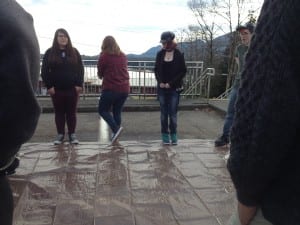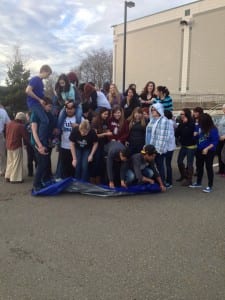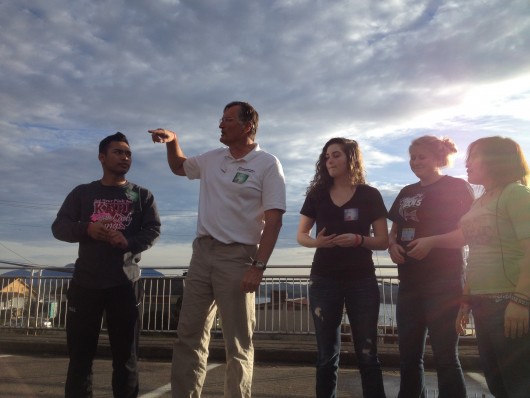About 70 teenagers seated in a semi-circle of bleachers reach excitedly, catching silicone bracelets tossed through the air.
“So you’re getting a bracelet right now with red. Red is the rule of five. Red is the rule of five.”
Derek Petersen, who is leading the retreat, said five is the minimum number of adults teen should be able to rely on. The Empowering Youth workshop focused not on individually empowering teens, but on ensuring each has a strong network of support.
The color coded bracelets represent different components of a strong support network and by the end of the two days, the teens will have a rainbows on their wrists.
Peterson has taken his workshop all over the world, but it started in Southeast Alaska about 20 years ago. He was in Ketchikan last year for a weekend with the Student Body Association.
This year, the event was open to all students, but teacher Lori Ortiz, who helped organize the workshop, also took a targeted approach, starting with a survey. She said, “ it was very simple we said name two students you respect, and we were looking for the obvious front line leaders, that’s wonderful too, but those kids who are respected because they’re the ones that quietly stand up or always reaching out and they’re seen as leaders from the kids themselves.”
That’s what brought freshman Zach Tighe. He found an invitation taped to his locker.“It said you have been selected by your peers to participate.” He was surprised someone nominated him, but accepted the invitation without hesitation. “I figured it was probably figured it was going to be similar to Challenge Day, and it’s actually a lot different.”
Challenge Day is a national program that offers a day-long workshop to help students break down barriers and understand each other better.
Empowering Youth replaced Challenge Day this year. Most of Ketchikan’s high school kids have participated in Challenge Day, so school officials thought it was a good idea to switch it up, at least for one year.
Tighe said the biggest difference was that today had more games.
One game was called “turning the world around.” Groups of teens stood outside on tarps, talking about what they would like Ketchikan to look like. Groups talked about Ketchikan having more people, less people, more neighborly, less drugs.
Then they flipped their tarps over. Where they were standing now was Ketchikan as it is today. The challenge was, without touching the ground (leaving Ketchikan), to turn it over, into the place they wanted it to be. There was lots of strategies and giggling.
For the final challenge, everyone gathered on one tarp and tried the same thing. People started hopping on shoulders to make more room, but it wasn’t enough. Petersen called time and asked, “How is this activity like working together to go from where you are to where you want to be?” Students responded “harder, painful.” “It is painful. It’s not going to be easy,” Peterson agreed.
The exact metaphor was a bit lost on Tighe, but he understood there was a bigger message.
“It’s kind of really just about trying to teach you to work together with people.”
Petersen said the games and bracelets are just ways to help tell a story. “We’re teaching them the story, so they can pass the story throughout the community.” He said it’s a story adults should learn too: That teens are only as strong as their support.
In connection with this event there is an open workshop February 18th for adults from 6- 8:30 at the Kayhi Library.






